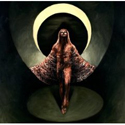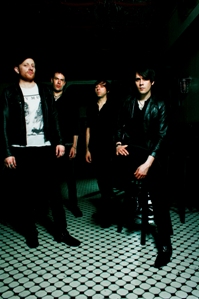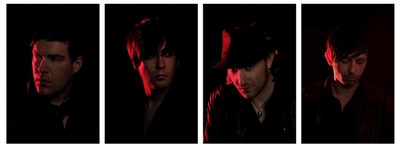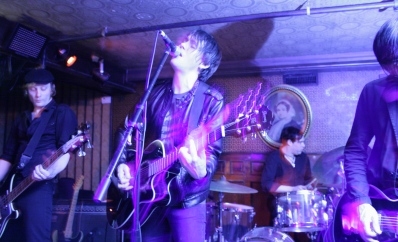
Blacklist
Power on to Zero Hour
Matthew Moyer

Let’s be clear, with the release of Midnight of the Century, New York’s
Blacklist are poised to recover/redeem gothic music from the Hot Topic hoi
polloi. The young quartet of Josh Strawn (vocals, guitar), Ryan Rayhill (bass), Glenn Maryansky (drums), and James Minor (guitar) have created an album full of
triumphant darkling gems that recall Sisters of Mercy, the Chameleons, Joy
Division and the Bolshoi and inject them with a dose of agitprop
worthy of a Christopher Hitchens essay. With production help from Ed
Buller (London Suede, Raincoats), they’ve created a huge sound that soars
thrillingly and plunges to terminal depths. Alongside Crystal Stilts and
Cold Cave, darkness descending has never sounded so fucking good. Ink 19
chatted with smart-as-a-whip frontman Josh Strawn, just back from a
European tour, about truth, beauty and Scott Walker.
Please introduce yourselves and give a little background on how Blacklist came to be. It started out as a duo with you and Ryan (Rayhill, bass)? When did you know that James (Minor, guitar) and Glenn (Maryansky, drums) were good fits for the band?
Well, it was always Ryan’s baby. We met, he asked me if I wanted to get something going, we played with some other folks for a while – our earliest tunes were pretty damn loud and hard, heavily influenced by Motorhead and Iron Maiden.
Are you happy with Midnight of the Century?
Yes, definitely. Of course you complete something and then you always think of ways to top yourself, but that doesn’t mean you dislike what you’ve created. I think this record ended up being exactly what we meant for it to be.
The sound on the album is huge, quite a bit fuller than the Solidaire EP. How were you able to get Ed Buller to mix the album? I’m assuming you’re all fans of Suede’s Dog Man Star album? What was it like working with him?
We asked him, basically, and he said yes. Kind of like the story (dunno if it’s true) about Slowdive asking Brian Eno to play on their record. You just find the right channels to reach out and hope the guy says yes – especially if he’s one of your heroes, and Ed most certainly is so we were thrilled. The Suede connection is obvious, but I was a Psychedelic Furs fan before I was a Suede fan, and Ed was their keyboardist. It was actually the production on Suede’s “Coming Up” that made me think Ed would be ideal for this record. Those songs all felt very large, very ready for the stadium, but not in a way that made the music feel over-polished or dumb or fake. Working with him was fantastic, and it should be said that he was incredibly patient with us. I don’t think it’s every day Ed is getting mix references as different as The Lucy Show’s Undone and Def Leppard’s Pyromania. Given the task we laid on him, I think he really nailed it.
Tell me about the recording of Midnight of the Century. Did you have all of the material worked out beforehand, or did any songs kind of emerge on the spot?
Ninety-nine percent of the writing was done ahead of time, so it was generally about performance and translation. When I say translation I mean that in the overdub process, things can grow and change. “The Cunning of History” was the one song that sort of grew on the spot and developed into something that we felt really added a meditative moment to an otherwise charging forward set of songs.
Some of the material on Midnight of the Century existed in slightly different forms before the release of the album; how did you approach reworking this material for the album?
No song was ever recorded twice. We only have ever taken original takes and had them re-mixed. It’s just that these days, you can do so much creatively in the mix that it probably sounds like more was changed or re-recorded than actually was.
What is the division of labor as far as songwriting? How much is collaborative and how much is individual vision?
It’s almost entirely collaborative. Even the songs that come from somebody bringing in a riff or a chord progression always end up with everybody’s stamp on them in one way or another. It’s our virtue and vice that we can only sound like us.
A lot of time was obviously spent on the lyrics. There are allusions to film, literature, current events – what inspires the writing process? Is it difficult locking in the lyrics to the music?
What doesn’t inspire it?! The truth is, most of the record I think has a strange cocktail of anger and hope. That’s how I see it, and it’s probably how I was seeing things at the time. I’d take in something I had experienced or read about, usually relating to world events or history, I’d get angry and then try to go beyond pure anger to something else. Not just “hope” per se, but something more than a rant. I can’t guarantee it will always be that way, like some songwriters whose voices and style are always dependably this or that. Lately I’m much more captivated by mystery and atmosphere and visceral pain. No voice in the world sounds better to me these days than Scott Kelly of Neurosis – the guy sounds like he’s been gargling glass all his life. It’s extremely moving and emotional.
I guess for me though, lyrically, I’ve always loved records that thematically capture a moment in history or a point of view rather perfectly and thoroughly. To an extent everything’s been said, but as times change, the way things are said change, too. I feel a kinship with everyone from Geezer Butler to Andrew Eldritch to Richey Edwards, even to old U2. If you listen, the message of “Seconds” off of U2’s War is nearly identical to “Electric Funeral” by Black Sabbath. But as times change, moods change, there’s always a point where these timeless messages deserve a re-think. I wanted Midnight to be the ultimate post-9/11 rock and roll record, not just a Bush-era record, and also not just a politics record. I wanted it to encapsulate as much that was unique about this moment in time as I wanted to repeat some basic principles that I think always deserve repeating.
As far as making the words fit the music, I try never to force anything. Believe it or not, I tend to sing nonsense syllables first that I think sound cool to the ear, then I mold the words to them. The kiss of death for a “serious” lyricist is forgetting that first and foremost it’s music, not poetry. The best poets are almost never songwriters. Someday it might be fun to experiment with more off-the-wall poetic stuff, but for this record, which I wanted to walk its walk by being universally communicative, I felt it was always best to go with the simpler wordings that would translate to people whose first language wasn’t English.

Who did the cover design? I like how you mix this almost flamboyant cover image (it reminds me of Mick Ronson) with this shadowy group shot that makes Joy Division photos look like they’re mugging for the camera. It adds some mystique to the music.
We’re all pretty actively involved in visual presentation. For the cover, though, I gave Pieter a few lyrical/conceptual jumping points, we entrusted it to him and he just nailed it. But now I’m just going to start telling everyone it’s Mick Ronson. I think in the era of Flickr and Facebook Blackberry photo updates, it’s just common courtesy to refrain from shoving your mug in people’s face. I judge a person’s mental health by the amount of Facebook photos they have of themselves.
Do you feel a kinship with the other artists on the Wierd roster? I get a kind of Factory Records vibe off of Wierd, in terms of art being more important than commercial considerations….
Most definitely. Wierd is as much an aesthetic as it is a think-tank and a close-knit group of friends. We sometimes have “summits” where we meet at a bar to discuss what we’re all trying to accomplish with music vis à vis the political/technological landscape. Sometimes there’s no summit, just drinks and good company. I think we all cherish something similar in music and even if Blacklist goes about it with loud guitars while most Wierd bands opt for synthesizers: the abiding need to create art that is humanistic and in some vital way “real” seems to be the unifying thread. And we’d all be lying if any of us said we weren’t a dark-hearted gaggle.
People make the Factory connection to Wierd quite a bit, which I think is great. Although times have changed – being outside the big-time music machine was something then, whereas the absence of any big machine means that opposing it by being anti-commercial doesn’t mean as much. Nowadays it’s more of a resistance against the demands that blogger culture and the Internet have placed on art. I think the difference between Wierd and Factory is, our ethical stance revolves much more around what aspects of our music we are and aren’t willing to submit to the caprices of the web. Like music critics who get jobs not because of a deep knowledge of or appreciation for music, but because their brand of pompous snark pulls page hits. There’ll be another right behind them, as with Friendster, Myspace, and Facebook. Then there’s exposurism, this idea that you just need to put your face in front of as many faces as possible to get ahead, and that exposure as opposed to talent is the key to success. Watch our label mate Sean McBride operate his synthesizers – it’s similar to watching Florida death metal guitarists shred – not musically but in the amount of technical skill required. You can’t argue with that kind of talent and it runs in direct opposition to the culture of exposurism.
Depending on when you get this email, you’re either just back from or in the midst of a European jaunt. Would you tell me one good story from it?
Wow, it’s hard to pick just one. The best story is just how many fantastic people we met, both behind the scenes and in the crowds. But I will say, our hotel in Austria had a top floor filled with deer and ram skulls, complete with antlers and horns. We arrived, reasonably inebriated, to find this hall of exquisitely evil looking stuff, which we then proceeded to remove from the wall and run about the hallways with them over our faces. Just around that time, the Twisted Nerve folks were coming up the stairs, got startled by our black metal antics and proceeded to curse us in their endearing Scottish accents. All this led up to us partying with them through the night while the balcony outside was framed with a giant mountain (Alp-sized) and a full moon. I don’t care if you’re into Dirty Projectors or Darkthrone, that’s fun stuff.
Who are some of the bands that have influenced Blacklist? (I apologize if you’ve been asked this question ad nauseum, but any opportunity I have to hear someone rhapsodize about Scott Walker and Motorhead at the same time, I’m going to jump on it.)
Fair enough! It’s definitely been an evolution. For me Scott Walker is an ever-guiding force. The hours and hours I’ve spent singing along to Scott 4 and ‘Til The Band Comes In… Nevertheless, I’ve loved Ozzy Osbourne since I was a kid and I’ve always been in that camp that finds it criminal that the Sisters of Mercy were relegated to being genre godfathers when in fact it was just simply some of the best, smartest, moodiest rock and roll of its time (or any time). Ryan and I bonded over that sentiment.
Plus we’ve always gotten a certain amount of contrarian glee out of coming from a very “hip” music scene in NYC and Brooklyn where everyone who’s supposedly all about going against the grain minds their P’s and Q’s, and saying, “Hey guys, this is what it looks like when you don’t cloak your love for Ratt and The Sisters of Mercy in irony or secrecy.” You can go to Beacon’s Closet in Brooklyn, a clothing store closely associated with lots of hip music acts like Golden Triangle. You’ll hear the Sisters all the time, so to us it’s odd that somehow the powers-of-cool-that-be permit you to like a band like that but say you’re influenced by them, or actually sound influenced by them, and they’re utterly confused. A bit disingenuous, if you ask me, and I think we always took an attitude of “fuck that” where that’s concerned. Same with the way music from the ’80s is now “retro,” yet make a record meticulously aping Brian Wilson and suddenly you’re contemporary. Silly and arbitrary, all of that.
But when it came to finding an identity, it was discovering a particular mood captured by these rarer European bands: Asylum Party, Mecano, the Sound, the Comsat Angels, Modern Eon. I think what we always wanted was something that had the power, sonic depth and heaviness of Sabbath or Motorhead, but the sophistication, tension, sexuality, and atmosphere of Coldwave. Some magazine or blog called us “doom rock” a while back. I guess as a huge fan of Pentagram and Sunn O))), I kinda dig that. I’d love to think we’re the rock to their metal, and especially now, with bands like Amesoeurs, the Coldwave-metal connection is not as odd a hybrid as I think it might once have seemed.

What made you want to play music and perform?
It’s hard to go back and imagine when I had that moment where I looked at this or that band and said, “That’s what I want to do with my life.” Honestly it was picking up the guitar and just having this strange love for the instrument, which fed into an adolescent fascination for guitar heroes – which then meant everything from classic rock like Hendrix, Page and Ritchie Blackmore to Eddie Van Halen, Steve Vai, Kirk Hammett, and Dimebag Darrell. I don’t suppose I started paying attention to performers and singers and the art of the song itself until after metal, after industrial, I got into stuff like Bowie, who, at his best, is just a perfect songwriter.
What is your first memory of music?
My parents went through this phase where they had decided, since they were having kids, they’d try to do less of the rock and roll thing, more of the good parents, let’s go to church and throw out our Zeppelin records thing. But my dad was too rock and roll to go all the way; he brought home a record from recently “born-again” Kansas member Kerry Livgren that had a tune on it called “Mask of the Great Deceiver.” Dark, cinematic synth intro, vocals on that particular track by Ronnie James Dio. Lyrics, of course, all about the devil. That song is truly my earliest most conscious memory of hearing music and I loved it.
Would you prefer Midnight of the Century to be heard as a whole or do you not mind if it is downloaded piecemeal and shuffled, etc.?
I think almost a new challenge to any artist is, can you make both work? I’ll always prefer the album experience and I’ll always prefer the album to be listened to as a whole, because it does have an intentional progression. But by the same token, I want people to hear a single and be jazzed. It’s always really cool if you can compound everything and make it work both ways. I love when people come up to me at shows and ask me why I write so much using imagery from Islam or political affairs or when they want to talk philosophy. But I also love that somebody rocks Midnight and tells me it makes them want to drive 200 mph at night pulling on a bottle of liquor screaming to the skies. I mean, maybe that’s confusing, but I actually think it’s how the best stuff works. Not to harp on Sabbath, but you don’t HAVE to be in political anti-war serious mode to feel like “War Pigs” makes you wanna rock the fuck out… but at the end of the day those tunes had a message.
For music that does have a darker feel, at the same time there is this cinematic, heroic impulse to it, some really fist-in-the-air or lump-in-the-throat moments. It sounds like you’re always reaching for something bigger, more transcendent…
I guess something that always stuck with me was hearing Bono once say of Björk that it’s far too easy to just paint in black – that the ecstasy in her songs was what was truly impressive. Now, after listening to the latest slices of genius from Blut Aus Nord or Xasthur, I don’t know that I can agree 100% – BUT, I do think that the ecstatic moments of the music I’ve fallen in love with were what I felt made sense for this record and what I hoped to achieve. Bands like the Manic Street Preachers, Suede, The Psychedelic Furs, and The Chameleons for me have this. Exactly as you say, a kind of triumphant fist in the air, cutting through the gloomy atmosphere.
Is the performing as important as recording music for you? How important are visuals in the presentation of your band?
I love performing as much as recording. Visuals are important, too, I think we’re the kind of band that could easily be tempted to do a Pink Floyd-type stage show if logistics and resources ever permitted.
You’re still a young band; what would you like to accomplish with Blacklist?
I don’t know if it’s possible anymore to accomplish a musical project that speaks as loudly and as widely as The Beatles or Elvis, or even Guns ‘n’ Roses for that matter. If there was any one ambition of Midnight that I don’t know will be met, it’s that I wanted to see if that could still happen. There was almost an art-project aspect to the decision to make accessible pop/rock songs that were mini-manifestos for the zeitgeist. But I think it’s very literal and logistical that media has changed so that that will never happen again, at least not for a long time. The world is entirely too personalized and splintered. Lately I look forward to indulging some of the harsher and maybe more difficult sides of ourselves and our tastes that we chose not to indulge on this record. Glenn used to be a drummer in hardcore bands. I love noise and industrial music, and lots of heavier, weirder stuff like later Scott Walker (Tilt, The Drift). As mentioned, Ryan and I started out vibing on a lot of NWOBHM. But still these kinds of romantic pop tunes are near and dear to us, and I could see doing a record almost exclusively like The Believer and Odessa with acoustic guitars and strings. I guess long story short, I want to do it all. Plenty of bands have done it, from Lou Reed to Talk Talk to Ulver, and I think we will, too.
What are you working on next? Do you have projects outside of Blacklist?
I also play with a band called Religious to Damn with an extraordinary Afghan songwriter and frontwoman named Zohra Atash. Zohra lets me get my avant-garde ya-yas out, especially on the production end of things, but I primarily play guitar and do some background vocals here and there. Influences range from Kate Bush to Fleetwood Mac to early Japan and Nico. We’re about to release our first full-length in early 2010 and I’m very much looking forward to that. Also, I’ve recently been rounded up by an interesting collective of folks here to work on an experimental heavy music project with Lev Weinstein (drummer of NYC black metal darlings Krallice and art-doom band Bloody Panda) and Robert Lowe (a.k.a. Lichens). That project is still very much in its infant stages, and who knows if we’ll ultimately pull it together, but I’m excited see what might come of it.
Wierd Records: http://www.wierdrecords.com ◼












